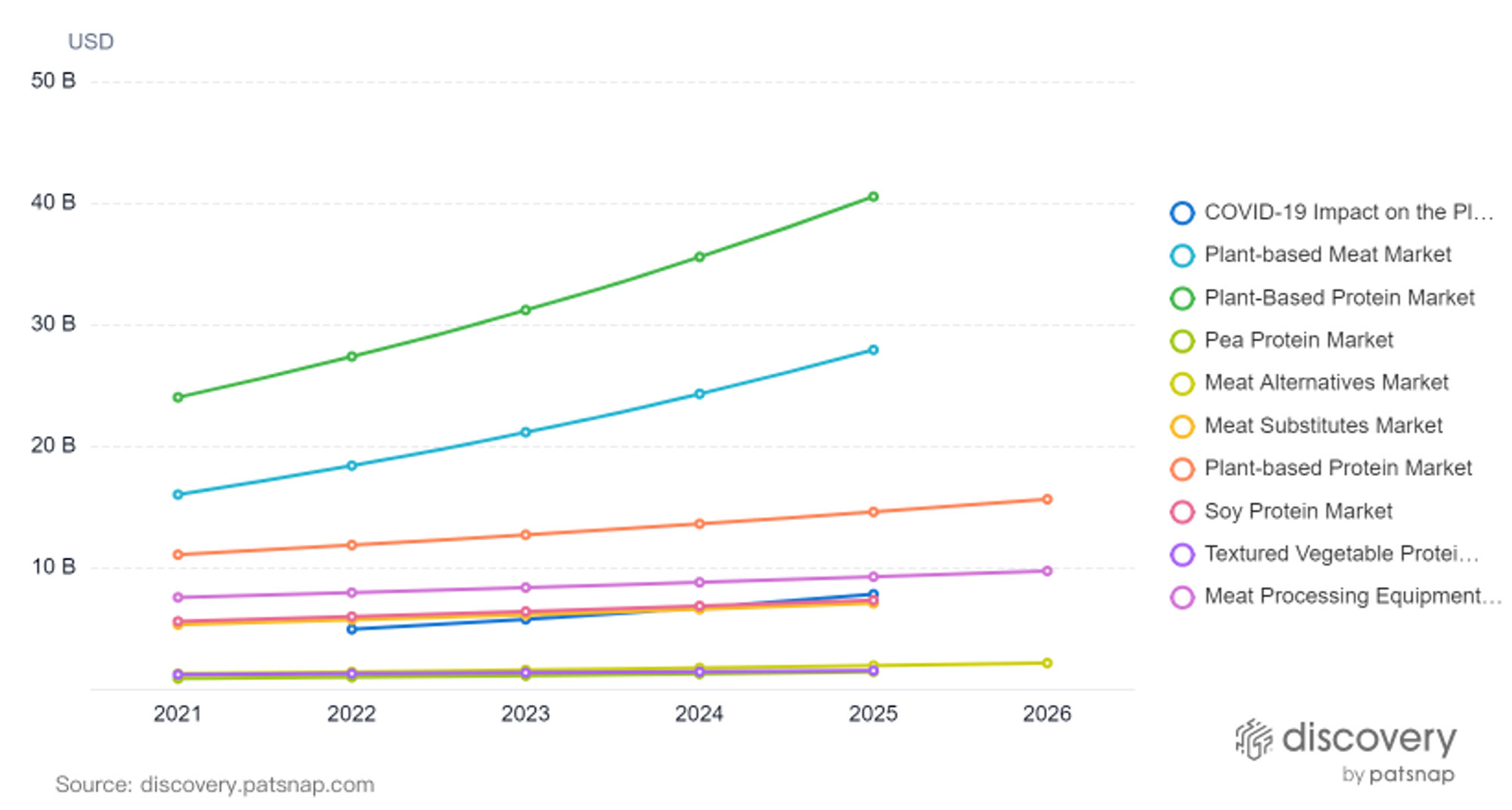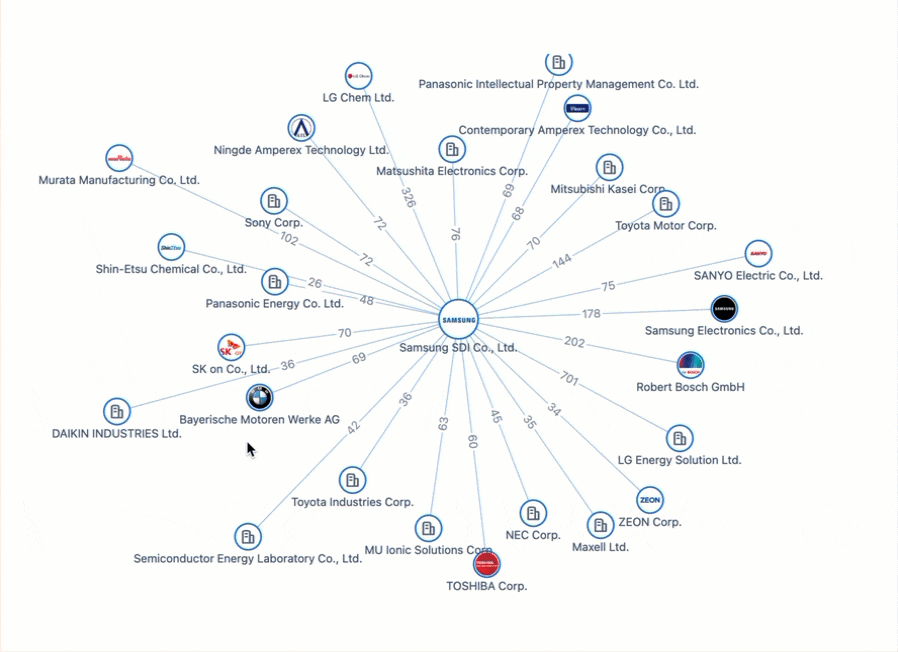A Meatless Future? Six Companies Shaping the Meat Alternatives Industry
The meat alternatives industry is rapidly evolving. Here are 6 companies shaping the future of the meat industry.
Meatless meat is on the rise with more than 454 million non-meat eaters in the world, and countless others seeking healthier alternatives. What started out as a niche industry has grown exponentially, becoming a mainstream staple.
This has us questioning: is our future (at least in part) meatless?

Figure 1: Meat alternatives and plant-based meats are an expanding industry, trending towards becoming an estimated $28 billion market by 2025. Source: Discovery™ by PatSnap
The meat alternative industry is expected to grow to a nearly $28 billion market by 2025, with an average CAGR of 14.94%. This is in large part due to consumers becoming increasingly health conscious and more concerned with the ethical and environmental impacts of the meat industry.
With the onset of the COVID-19 pandemic, we saw many consumers analyzing the issues in the meat supply chain for the first time, including the ethical treatment of animals and the health of the workers.
Another huge driver in the interest of meat alternatives is the impact of livestock on the environment. Livestock cultivation is responsible for 14.5% of global greenhouse gases, and takes up nearly 80% of global agricultural land. Plant-based foods have the potential to vastly lower our carbon footprint – in the hypothetical scenario in which the whole world adopts a plant-based diet, the total agricultural land use would shrink from 4.1 billion hectares to one billion hectares, a 75% reduction. What’s more, this adoption could cut our global water footprint in half.
A more realistic goal of a mix of plant-based and meat-based diets would still result in a massively improved environmental impact. Many consumers have expressed an interest in eating high-quality meat for important meals, while relying on plant-based protein for daily nutrition (think plant-based chicken tenders for lunch, but a perfectly-seared, sustainably-caught Turbot filet for dinner).
In this article we will explore six companies shaping the future of the meat alternatives industry:
1. Impossible Foods
Founded in 2011 by Dr. Patrick O. Brown, Learn more is one of the biggest players in the meat alternatives space. The company started with a simple question: “What makes meat taste like meat?” and what they found might shock you.
Impossible FoodsHeme is an iron containing, essential molecule found in every living plant and animal, more abundantly in animals. Impossible foods was the first to discover that heme, is what makes meat taste like meat. They have worked to find a way to cultivate plant-based heme via the fermentation of genetically engineered yeast, which gives their burgers an unmistakable flavor and the aroma of cooked meat.
Plus, The Impossible Burger, claims to use 75% less water, generate 87% less greenhouse gases and requires 95% less land for its production. Impossible foods have also released sausage, chicken nugget, meatball, and pork alternatives. We can’t wait to see what they do next.
2. Kuleana
Founded by food scientists, Kuleana, a San Francisco startup, is combining plants and biotechnology to recreate everything we love about seafood. Using a mixture of sustainable plant-based ingredients including algae, potato, bamboo and radish – they are working to develop sushi-grade seafood, with the same great taste, texture, and healthy omega-3 DHAs, without the use of hooks or fishing nets.
Kuleana is on a mission to ‘reimagine the food system with a seafood option that can sustainably and satisfyingly feed Earth’s next billion people.’ They kickstarted this mission by adding protein to their formula – making Kuleana as nutritionally satisfying as the real thing and partnering with Blue Sushi Sake Grill and Erewhon Market. They can be found on the menus of diverse restaurants across the United States and purchased online nationwide through GTFO It's Vegan.
TIME Magazine featured Kuleana’s plant-based Tuna as one of the best inventions of 2021; praising it for having comparable levels of iron, vitamin B12, and omega-3 fatty acids to conventional tuna, while being free of the harmful substances found in fish such as microplastics, mercury and cholesterol. Kuleana is also planning to launch plant-based salmon in the near future, and we can’t wait to try it. You no longer have to choose between your spicy tuna roll, and eating plant-based, with Kuleana you get the best of both worlds.
3. Good Catch Foods
Founded by brothers and chefs, Good Catch Foods, a New York City based startup, is revolutionizing the $120 billion seafood industry with plants. Their goal is to bring awareness to the fishing industry’s environmental impact on marine life by creating a product line with the same texture, flavor, and nutritional value as many popular seafood dishes.
In 2021 they took the world by storm, catching the eyes of investors and celebrities; Lance Bass, Paris Hilton, Woody Harrelson, and Shailene Woodley have all invested in the company.
Bumble Bee Foods, the international tuna giant, surprised the industry when they partnered with Good Catch to distribute their products. Bumble Bee CEO, Jan Tharp, explained as an industry it’s importance to “find innovative solutions to decouple growth with environmental impact and increase their commitment to ocean health.”
Good Catch has worked diligently to create alternative fish sticks, crab cakes, fish cakes, tuna and more – thanks to their protein packed six-legume blend of peas, chickpeas, lentils, soy, fava beans, and navy beans. Think of them next time you’re craving that Tuna melt!
4. Novameat
Founded by Italian bioengineer Giuseppe Scionti, Novameat has discovered a way to “bio-hack” plant-based proteins at the micro- and nanoscale giving them a meat-like texture. Texture and mouthfeel are big hurdles often troubling meat alternative companies, and Novameat is working to find a way to do this.
Using a specialized 3D printer, which utilizes syringes of plant protein pastes to create steak and chicken simulacrums, Scionti has been able to produce plant-based meat with the same “muscley” and fat marbled texture of animal meat. They can print 100 grams of meat in 30 minutes at the cost of 2 euros – and Scioti is confident that this cost will go down as they increase in scale.
While Novameat is still in its early prototype stages and 3D printing in the food industry is still in its initial stages, as the technology evolves, and the cost drops it’s poised to have a huge impact on the food industry. Would you try 3D-printed meat?
5. Odontella
Founded in 2016, Odontella is the world’s first business to develop food products based on marine and micro-algae. They have a strong belief that microalgae offer a strong potential for the future of innovation in the food sector as an alternative to the scarcity of natural resources in the world.
Odontella released their first product, a vegan smoked salmon called Solmon, in France in 2018, and they have since partnered with two “giant vegan food retailers” for several million euros. These partnerships will involve distributing their products to over 24 countries in retail stores.
Their next product is rumored to be a microalgae-based steak substitute named Tona, followed by several other new vegan product offerings stemming from their seven-strong patent portfolio. While algae-based food products remain overshadowed by plant-based proteins and lab-grown meats, they are one to watch out for.
6. Upside Foods (Previously Memphis Meats)
Founded in 2015, Upside Foods was one of the first cultivated meat companies in the world. They produce meat from self-reproducing cells, growing a meat that is animal-based, without the need for livestock cultivation. In 2016 they released their first synthetic meatball, followed by the world’s first cell-grown chicken and duck in 2017.
They have raised over $200 million in funding and have recently announced their intention to use CRISPR to help them develop lab-grown meat with even less consumption of land and water, and even less environmental impact.
The first product they plan to launch commercially is expected to be chicken, given its popularity around the globe. Using the cells from a single chicken, they are able to cultivate the same amount of poultry that would come from thousands of traditionally farmed birds. Upside maintains that their platform can grow all types of cells and tissues. Will you be trying their lab-grown chicken?
The Future of the Meat-Alternative Industry
As this industry continues to grow, and the demand for meat alternatives increases, we expect “fake meat” to keep on trending as consumers become more health and environmentally conscious. Furthermore, lab-grown and plant-derived meat alternatives may challenge the traditional industry to be more sustainable and ethical, improving outcomes all around.
Interested in more meatless meat innovations? Download our FREE Analytical Insights Report.
Your recommended content
-

Patsnap Surpasses US$100 Million in Annual Recurring Revenue
Category: Article | Category: News/PR
Wednesday, June 12, 2024
Patsnap has reached a significant milestone of achieving $100M in Annual Recurring Revenue (ARR), marking an impressive 20% year-over-year growth in 2023. This milestone highlights the massive and meaningful value our platform brings to over 12,000 IP and R&D teams across 50 countries, driving efficiency, productivity, and collaboration.
-

Introducing Hiro, an AI assistant built for IP and R&D workflows
Category: AI advancements | Category: AI development | Category: AI-tools | Category: Article | Category: artificial intelligence
Tuesday, May 14, 2024
Powered by Patsnap’s industry-specific LLM, Hiro is designed to streamline IP and R&D workflows from ideation to product launch. With its robust AI capabilities, Hiro brings a new level of efficiency, precision, and security to tasks that were once time-consuming and labor-intensive.What sets Hiro apart is that it draws from our large language model that’s been trained on market-leading patent records, academic papers, and proprietary innovation data. This ensures we deliver more accurate and reliable results for every prompt.
-

Powering the Future of Electric Vehicles: The Battle for Battery Innovation and Patents
Category: Article | Category: battery technology | Category: electric vehicle | Category: EV | Category: lithium ion | Category: lithium ion battery | Category: NEV | Category: new energy vehicles
Monday, April 22, 2024
In the ever-evolving landscape of innovation, the electric vehicle (EV) industry stands as a beacon of technological transformation. As we explore the patents propelling the EV revolution, Apple's venture serves as a poignant example of the challenges even industry giants face in this competitive arena. Join us on a journey through the global patent landscape, where the quest for superior power solutions unfolds, and where the true pioneers of the EV revolution are making their mark.